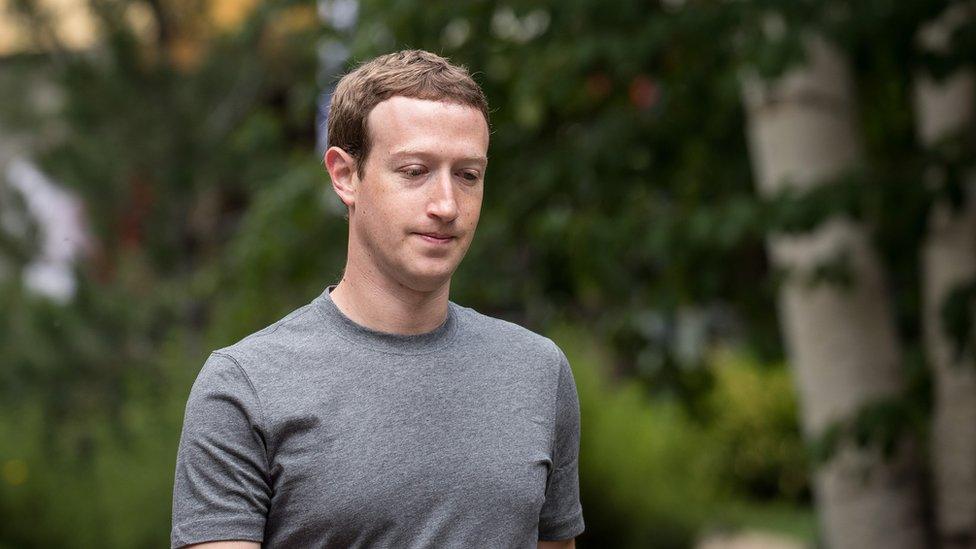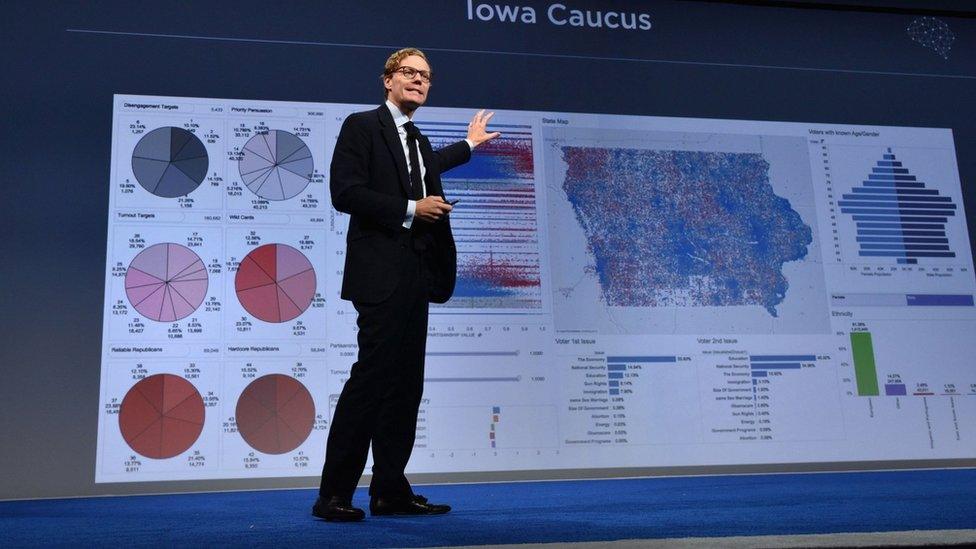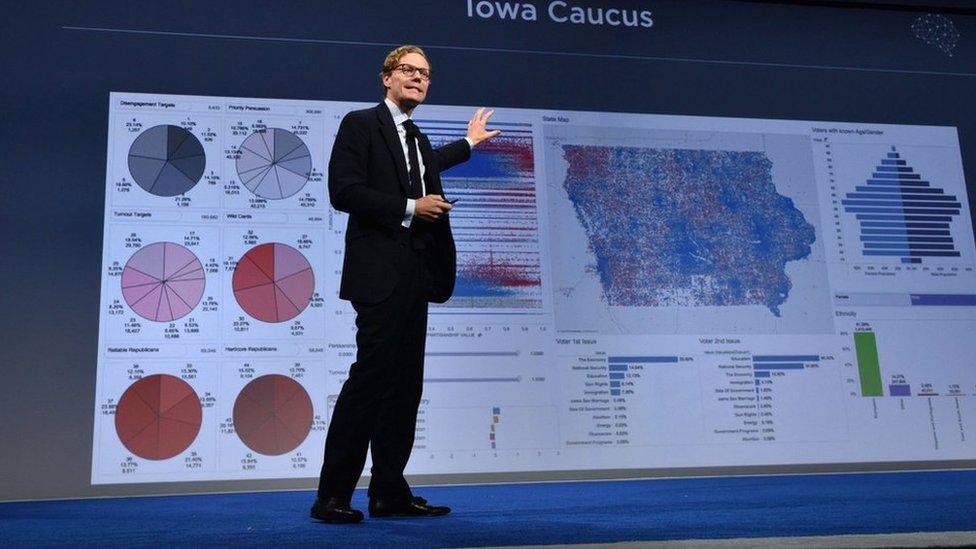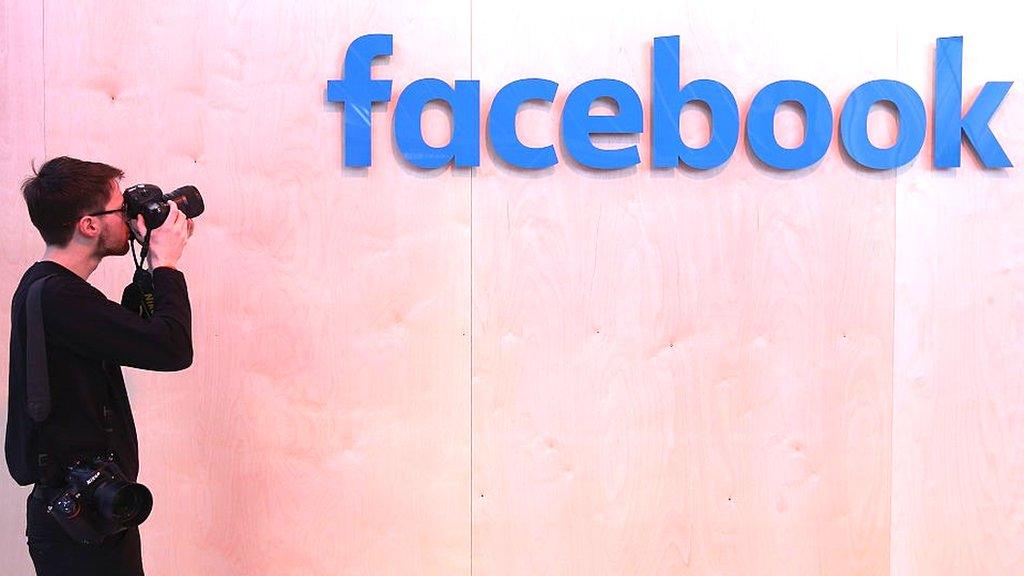Pressure mounts on Zuckerberg to face data breach concerns
- Published
- comments

Facebook founder and chief executive Mark Zuckerberg is facing intensified calls to appear in person at investigations into the social network's conduct.
His company has been accused of failing to properly inform users that their profile information may have been obtained and kept by Cambridge Analytica, a data firm widely-credited with helping Donald Trump win the 2016 US presidential election.
Facebook said on Friday it had blocked Cambridge Analytica from Facebook while it investigated claims the London-based firm did not, as promised, delete data that was allegedly obtained using methods that were in violation of Facebook's policies.
Both Cambridge Analytica and Facebook deny any wrongdoing.
Despite pledging that in 2018 he would "fix" his company, Facebook founder Mark Zuckerberg has managed to avoid engaging with the site's growing number of critics - instead sending lawyers or policy bosses to various committee hearings.
The 33-year-old's recent remarks on some of Facebook's controversies have been communicated in the relatively safe space of a blog post or video message published on his Facebook page.
With the building row over how Facebook data may have been used to fuel highly-targeted political propaganda, several influential figures on both side of the Atlantic this weekend said it was time for Mr Zuckerberg to step up to publicly defend - or at least justify - his creation.
Some called for investigations into whether Mr Zuckerberg's company may have violated laws governing disclosure of a data breach - and also rules on properly obtaining a user's consent to collect personal information.
"This is a major breach that must be investigated," demanded Democratic Senator Amy Klobuchar of Minnesota.
"It’s clear these platforms can’t police themselves. I've called for more transparency and accountability for online political ads. They say 'trust us'."
She added: "Mark Zuckerberg needs to testify before Senate Judiciary."
'High on themselves'
That sentiment was backed by Adam Schiff, the highest-ranking Democrat on the House Intelligence Committee, which is already investigating social media manipulation in the run up to the 2016 presidential election.
"I think it would be beneficial to have him come testify before the appropriate oversight committees," he told the Washington Post.
"And not just Mark but the other CEOs of the other major companies that operate in this space."
On Sunday morning TV, Florida senator and former presidential hopeful Marco Rubio told NBC's Meet the Press he felt technology companies acted as if they are "above" regulations.
"Their growth has been a lot faster than perhaps their ability to mature institutionally from within on some of these challenges that they're facing," he said.
"I think another part about it is sometimes these companies grow so fast and get so much good press, they get up high on themselves that they start to think that perhaps they're above sort of the rules that apply to everybody else."
The man in charge of Britain's investigation into Russian meddling in the democratic process said he too wanted to press Mr Zuckerberg on the issue.
"I will be writing to Mark Zuckerberg asking that either he or another senior executive from the company appear to give evidence in front of the committee as part our inquiry," said Damian Collins MP.
"It is not acceptable that they have previously sent witnesses who seek to avoid asking difficult questions by claiming not to know the answers."
In the age of big data, is our democracy open to manipulation?
Mr Collins also said he would be recalling Cambridge Analytica chief executive Alexander Nix to parliament to answer more questions.
"It seems clear that he has deliberately misled the committee and parliament," Mr. Collins said.
Cambridge Analytica and Mr Nix have denied any wrongdoing.
Deleted tweets
In an attempt to get out ahead of a story in the New York Times and Observer newspapers, Facebook made an announcement late Friday night, California time, that it was blocking Cambridge Analytica from using Facebook while it investigated claims the inappropriately-obtained data had not been deleted as promised.
This was followed by remarks from Alex Stamos, the firm's chief security officer, who wrote and then deleted a series of tweets. He objected to the word "breach" being used to describe how data from as many as 50 million peoples' user profiles may have been obtained without explicit user consent.
"I have deleted my tweets on Cambridge Analytica," he later wrote.
"Not because they were factually incorrect but because I should have done a better job weighing in."
Christopher Wylie, a Canadian data analytics expert who worked with Cambridge Analytica, revealed how it and its partners harvested data belonging to mostly US voters. Over the weekend, he announced he had been suspended from Facebook.
On top of its initial statement, Facebook on Sunday said it was conducting a "comprehensive internal and external review" into whether the data, gathered via an app created by Global Science Research (GSR), still existed.
GSR was set up by University of Cambridge associate professor Aleksandr Kogan and his colleague Joseph Chancellor. According to the Guardian, Mr Chancellor was given a job at Facebook as a researcher just months after GSR carried out the data-gathering exercise that Facebook now says violated its policies.
Facebook has not commented on the calls for Mr Zuckerberg to appear in front of the several committees expressing a desire to hear from him.
But one analyst warned that this controversy is a direct threat to Facebook's business model, and therefore Mr Zuckerberg will be expected to put investors at ease, sooner rather than later.
"This has potential to grow into something a lot more onerous," said Daniel Ives from GBH Insight.
"So he has to get ahead of this storm before it turns into a hurricane."
- Published18 March 2018

- Published16 February 2018
- Published16 March 2018
- Published17 March 2018

- Published17 March 2018
- Published14 March 2018

- Published14 March 2018
- Published14 March 2018
- Published13 March 2018

- Published12 February 2018

- Published6 March 2018

- Published5 March 2018